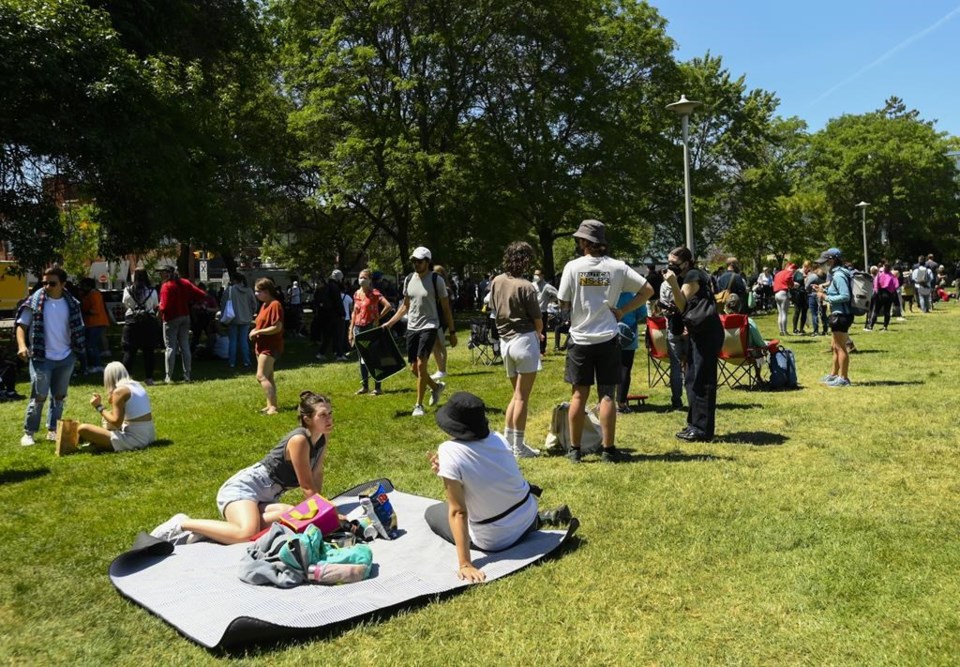TORONTO — For Stephen Ouderkirk, the normal anxieties of becoming a parent have been heightened as Ontario rolls back public health restrictions based on high COVID-19 vaccination rates and declining infections.
Children under 12 aren't eligible to receive any of the shots approved for use in Canada, and as Ontario prepares to lift more limits on businesses and gatherings, Ouderkirk is left wondering where his newborn son fits in.
"We feel kind of stuck, where there's clear guidance on what we can do individually but not us as a family," he said in a recent interview. "I know I can go into a restaurant and all that, but what can we do with him?"
The Minesing, Ont., resident said hisfamily is sticking to outdoor social gatherings and, for now, won't allow non-household members to hold their baby.
Ouderkirk said he'd like clear guidelines from the province on how to navigate the months ahead, especially as he prepares to return to work as an elementary school teacher in the fall with students who also aren't currently eligible for vaccines.
Experts have echoed his sentiment, saying young children and other unvaccinated populations shouldn't be forgotten as jurisdictions start lifting pandemic measures that have defined the last year and a half of life.
As of Monday, 79 per cent of adults in Ontario had received at least one COVID-19 vaccine dose and 56 per cent were fully vaccinated. Youth aged 12 to 17, who were the last demographic group to become eligible for shots, had a 60 per cent first-dose coverage rate and a full vaccination rate of 20 per cent.
The pace of the vaccine rollout and drop in daily infections has led the province to speed up its reopening plan by several days, allowing gyms and restaurants to resume indoor operations this Friday, while raising capacity limits for indoor social gatherings.
The Public Health Agency of Canada has outlined activity guidelines based on vaccination status but Ontario hasn’t released guidance specific to its reopening plan.
University of Toronto epidemiologist Ashleigh Tuite said the risk of COVID-19 infection has not gone away, but has shifted to unvaccinated populations like young children.
"I think we're leaving them behind right now," Tuite said.
Research indicates young kids aren't as likely to become severely ill from COVID-19. But Tuite noted that those statistically rare outcomes will be seen more frequently as restrictions roll back and the virus circulates further among children, making it essential for some precautions to remain in place.
"It's messy and complicated but I think we're in such a hurry for the pandemic to be over that we're not really thinking through the consequences for children."
Tuite pointed to masking in public places as an effective infection control measure that should stay in place as more businesses reopen. Face coverings will still be required under Step 3 of Ontario's reopening plan and beyond, with the policy being re-assessed going forward.
Tuite also noted that the province needs a safety plan for reopening schools that goes beyond relying on vaccination rates in adults and older children.
"Vaccines help to reduce the risk of introduction of cases in the school setting, but they're not going to alone serve to protect children once they're in the school setting," she said.
Ontario's opposition parties have said the government needs to improve ventilation and mandate smaller class sizes as it prepares its back-to-school plan.
The province's top doctor has said higher vaccination rates in the broader community will help protect young children by keeping infections low.
"By getting vaccinated and reducing the risk at a community level, we protect our children," Dr. Kieran Moore said late last week. He added that he's hopeful a vaccine might be approved for kids before the end of the year.
Pediatric infectious disease physician Dr. Nisha Thampi agreed that higher vaccination rates will help protect children but noted that the dynamic is complicated as people interact with others outside the home with different vaccination statuses.
Families with mixed vaccination status should keep following guidelines like staying home when sick, gathering outdoors where possible and wearing masks inside, she said.
She also stressed that people should keep up with regular handwashing to protect young children from other viruses that are expected to start circulating as social circles grow.
When it comes to how kids fit into the reopening plan, Thampi said she'd like to see more guidance about whether different rules will apply to them when restrictions roll back further, with details on what settings are most risky for them.
"It's going to be messy when we hold kids to a higher standard of infection prevention than adults," she said, pointing to the idea of vaccine passports, which were recently been announced in Quebec.
Prince Edward Island and Newfoundland and Labrador have recently reflected considerations for families with mixed vaccine status in their pandemic policies, exempting young children of vaccinated parents from self-isolation rules when entering the provinces, an approach Thampi said makes sense.
Ontario reported 114 new COVID-19 cases Monday and no new deaths from the virus.
This report by The Canadian Press was first published July 12, 2021.
Holly McKenzie-Sutter, The Canadian Press
